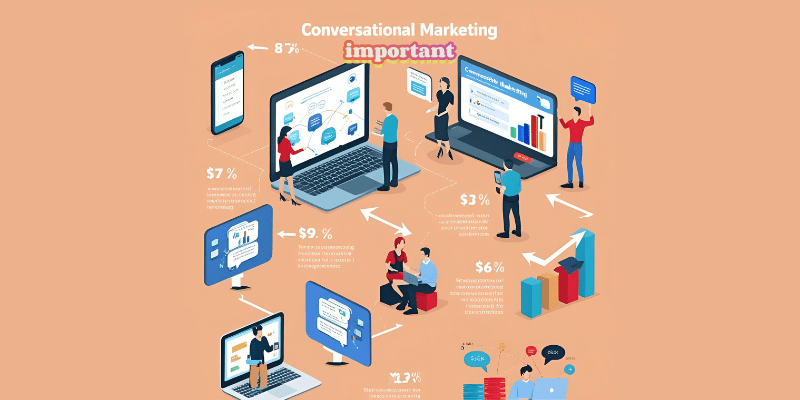What is Conversational Marketing and Why It’s Important?
Published: 09/Mar/2025
Businesses got you covered. This blog will answer these questions and show you how conversational marketing can enhance your customer engagement strategy.
Expect to learn about its benefits, successful implementation tactics, tools to consider, real-world examples, and emerging trends shaping the future of conversational marketing.
By the end, you’ll be able to start using conversational marketing important to drive meaningful interaction with your customers.

What is conversational marketing?
Conversational marketing is a customer-centric approach that uses real-time, two-way communication to engage and convert customers. This often includes the use of chatbots, live chats, personalized emails, and social media messaging.
Unlike traditional marketing channels that can feel impersonal or detached, conversational marketing creates human-like interactions. This makes your audience feel heard and valued, building trust and forming stronger relationships.
At its core, conversational marketing promotes natural dialogue. Imagine walking into a shop and being greeted by a friendly associate who not only listens to your preferences but also offers tailored suggestions. That’s what ‘conversation massage’ (a natural, supportive communication flow in a sales context) and ‘conversation selling’ aim to replicate in the digital space.
Why is conversational marketing important?
You might be wondering, “Why should I adopt this strategy?” Here are the top reasons that prove the importance of conversational marketing in today’s competitive ecosystem.
Enhanced Customer Experience
Conversational marketing improves the customer experience by enabling faster, more personalized interactions. People don’t want to wait hours or days for responses to their queries. Technologies such as chatbots allow businesses to provide real-time solutions, leaving customers satisfied and engaged.
Boost in Lead Generation
One of the reasons conversational marketing is so effective is its ability to capture valuable customer information. While chatting, customers often share their specific needs and preferences. Businesses can use these insights to generate quality leads and tailor their offerings.
Builds Relationships Through Personal Engagement
Conversational marketing allows businesses to create one-on-one dialogue with customers, breaking away from the one-size-fits-all strategy. Using ‘conversation language’ (tone and messaging tailored to each user’s personality), this method fosters deeper, more meaningful connections.
Drives Conversions
The personalized approach of conversational marketing has a direct impact on conversions. A Forrester study highlighted that AI-enabled chatbots have reduced cart abandonment rates by re-engaging customers with tailored offers.
Strategies for Conversational Marketing
Now that you understand why conversational marketing is important, let’s explore how to implement it effectively in your strategy.
Chatbots
Chatbots are a fundamental tool in conversational marketing. These AI-powered assistants can answer customer questions, provide product information, and even process transactions. For example, Domino’s Pizza uses its chatbot, Dom, to allow customers to order quickly, simply by messaging or talking to the chatbot.
Live Chat
Unlike chatbots, live chat puts your customer directly in touch with a human representative. This is ideal for more complex queries. For example, online clothing brands often use live chat to help customers with sizing questions or order cancellations.
Social Media Messaging
Platforms like Facebook Messenger, WhatsApp, and Instagram allow businesses to interact with customers on the social channels they already use. These services also empower businesses to send appointment reminders, updates, and product promotions directly to their audience.
Personalized Email Campaigns
Personalization adds value to your email campaigns. For instance, instead of sending a generic “Thank You” email, you could use collected data to suggest complementary products or services tailored to your customer’s purchase.
Tools to Facilitate Conversational Marketing
To execute an effective conversational marketing strategy, you’ll need the right tools. Here are some popular platforms that offer advanced features.
- Intercom: Ideal for businesses of all sizes, Intercom offers a mix of chatbots, live chat, and email automation to deliver personalized interactions.
- Drift: A B2B-focused conversational marketing platform known for its powerful lead qualification chatbot.
- Zendesk: While primarily a customer service tool, Zendesk can easily be adapted for conversational marketing with live chat and proactive support capabilities.
- HubSpot: HubSpot’s CRM includes chatbot functionality that integrates easily with existing marketing campaigns.
Examples of Conversational Marketing Success
Let’s look at a few real-world examples that highlight the use of conversational marketing strategies.
- Slack: Known for its conversational tone, Slack nails customer interactions with quick responses and tailored solutions via chatbot. This made its onboarding process seamless, driving customer satisfaction.
- Sephora’s use of chatbots to help customers book in-store makeovers and virtual consultations is highly praised. Customers enjoy the blend of convenience and personalization.
- Spotify: Spotify uses AI-powered bots to send personalized messages based on individual music preferences, creating an enjoyable user experience that customers appreciate.
Future Trends in Conversational Marketing
The future of conversational marketing is bright, with advancements in AI and machine learning shaping the landscape. Here are a few trends to watch for.
Voice Search Compatibility
With the rise of voice assistants like Alexa and Google Home, integrating conversational marketing into voice search could drive significant traffic.
Hyper-Personalization
Advanced data analytics tools will create even more tailored conversational experiences, making each customer interaction unique.
Multilingual Chatbots
To cater to a global audience, AI chatbots are being trained to understand and communicate in multiple languages effectively.
Conversational Commerce
Combining conversational marketing with eCommerce platforms will streamline the purchase process for customers, improving conversions further.
You might like these posts!
1- The power of interactive content in digital marketing
2- The importance of personalization in email marketing
FAQs about Conversational Marketing
1. What is conversational marketing?
Conversational marketing is a real-time, two-way communication strategy used to engage customers and convert leads through personalized dialogue.
2. Why is conversational marketing important?
It enhances the customer experience, generates quality leads, and fosters deeper and more direct communication.
3. What is conversational language?
This refers to the tone and approach businesses use in conversations that make the customer feel heard, valued, and connected.
4. How does conversational marketing differ from traditional marketing?
Unlike traditional methods, conversational marketing focuses on direct, instant interactions via chatbots, live chats, or social platforms.
5. What is conversational selling?
A sales strategy where businesses use real-time conversations to understand customer pain points and close sales more effectively.
6. Can small businesses use conversational marketing too?
Absolutely! Tools like chatbots and social media make conversational marketing accessible even for small businesses.
Build Meaningful Connections Through Conversational Marketing
It’s clear that conversational marketing isn’t just a trend; it’s a necessity. It helps businesses connect with customers on a deeper level, improve conversions, and stay competitive.
If you haven’t already embraced conversational marketing, now is the time. Start exploring tools like chatbots, live chat, and personalization techniques to incorporate conversational marketing into your strategy. By taking these small steps, you’ll create lasting connections and drive sustainable growth.
This post could interest you!
How to use micro-influencers for small business marketing?





